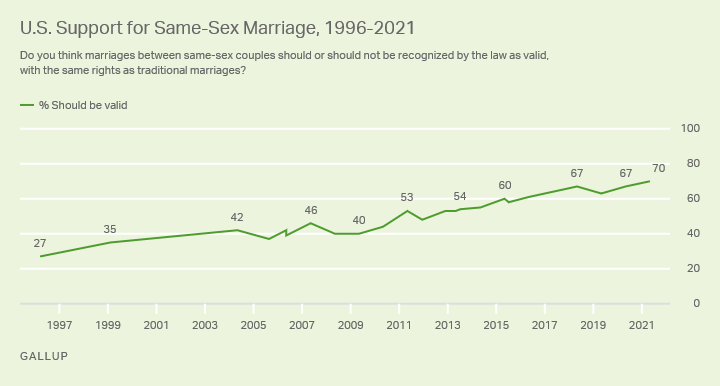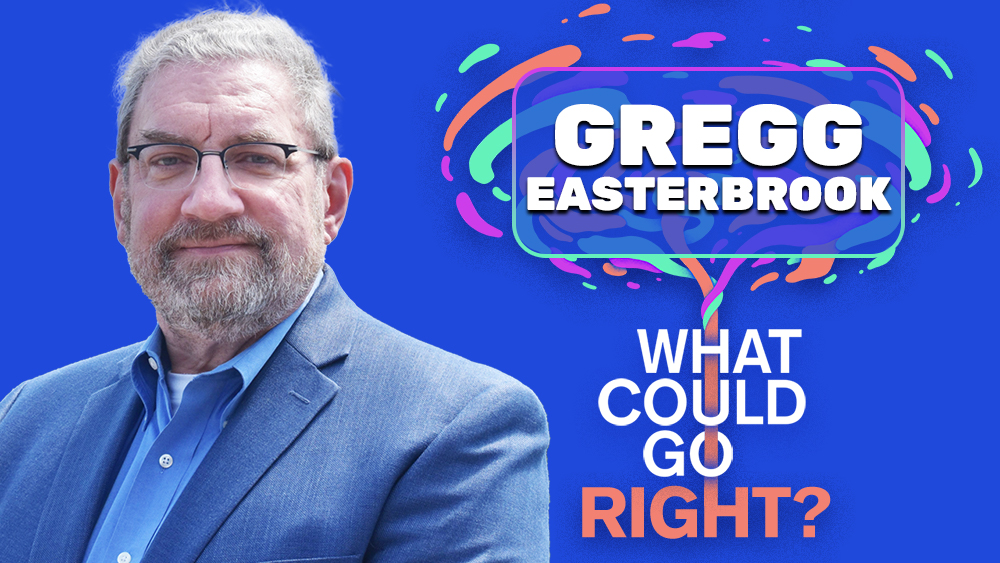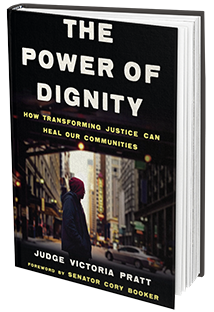Volcanoes are erupting in The Philippines, but on-fire Australia received some welcome rain. The Iran war cries have been called off and The Donald’s military powers are about to be hamstrung by the Senate. Meanwhile, his impeachment trial is starting, and we’re all on Twitter for a front-row seat.
What Could Go Right? OK, doomers
We’re paralyzed if we think everything is falling apart around us. It isn’t.
This is our weekly newsletter, What Could Go Right? Sign up here to receive it in your inbox every Thursday at 6am ET. You can read past issues here.
OK, doomers
These days, the narrative that the United States is circling the drain is common to hear. Add together the pandemic, the invasion of Ukraine, inflation, supply chain issues, and the polarized political climate, and you have easy pickins for anyone looking for evidence as to why the vibes are so dismal right now. The Justice Alito leak revved up that feeling even more, at least on the left.
But is the “failed state” rhetoric justified? Economist blogger Noah Smith thinks not. He starts his new piece on why America is not, in fact, collapsing with some tough talk that we probably need to hear:
Yes, I’m upset that the Supreme Court looks set to overturn Roe v. Wade. I believe in abortion rights, and at some level most other Americans do too. I think there’s going to be a big, long, and 100% justified backlash over it, and if activists play their cards right, they will eventually prevail. I’m obviously unhappy about the number of Americans who will suffer in the meantime, but living in a democracy is tough, and sometimes things that should take a day end up taking decades.
He then offers countervailing evidence to the dismal vibes list. Inflation sucks, but there’s also low unemployment coupled with rising wages, especially for the lowest-earning workers. Crime is rising, yes, but the levels are nowhere close to what we had in the 1990s. The Russian war is ongoing, but so far the Biden administration has been skillful in sending support without escalating the violence or edging the conflict toward a nuclear meltdown.
And what about perhaps the biggest item on the list, the Big Lie itself? Smith writes:
It’s true that the risk of a second attempt at election theft remains high in 2024. And Trump might very well be legitimately elected to a second term, which would indeed put us in grave danger of further democratic erosion. These are threats we should absolutely worry about. But we’re simply not there yet, and to act like these threats have already come to pass both devalues the hard work of all the people who stopped Trump from usurping power and reduces the motivation to fight for our democracy in 2024.
The motivation reduction argument is close to our hearts here at The Progress Network. It’s critical to set what’s going wrong in context as well as highlight what’s going right, because the type of doomerism Smith is talking about muddies our ability to respond effectively to things we care about and often leads to apathy. What’s the point of doing anything if we think everything is falling to pieces around us? As Smith puts it, “What we Americans need is a way to recognize problems without thinking that we’ve already lost and been overwhelmed.”
It is well within our power to talk ourselves into a collapse we can’t get out of before a collapse actually comes. Let’s sharpen our view and refocus that energy.
Is gay marriage next? Not so fast
Since last week there have been plenty of takes that the legal reasoning in the Alito draft sets the stage for the reversal of rights around same-sex marriage and individual sexual privacy. Scott Shackford, writing in Reason, doesn’t think those fears are well-founded, for reasons both legal and social. “While Alito may not agree with previous LGBT rulings from the court, this opinion is careful not to question their validity,” he says.
There is also the fact, as we mentioned last week, that the American public opinion on gay marriage has become more and more progressive over time—in fact, support keeps reaching record highs. It is moving upward in all age groups, and there is now, for the first time, majority support across voters of both parties. Opinions on abortion, on the other hand, have not changed much since the 1970s. So a reversal on gay marriage from the Supreme Court would be wildly unpopular across the whole of the American public in a way that abortion is not. Not to mention, as Shackford points out, “the kind of legal and contractual problems that would take place should the Supreme Court suddenly decide that states can simply refuse to acknowledge more than half a million same-sex marriages.”

Sharpen and refocus: the fight has moved to abortion pills and over-the-counter, affordable birth control.
Something else we’re chewing on is this Quartz piece on another way a post-Roe US isn’t the same as a pre-Roe one: the role of fathers. The article is old, but the point holds. Fatherhood was once easily escapable. “How can you prove I’m the one who got you pregnant?” But now the prevalence of DNA testing means that, well, it’s not only Maury—and the woman—who knows that you are the father. “Every one of the US’s 50 states,” says the article, “has some form of child support law saying the biological parent of any baby needs to financially support that child, whether he or she wanted to be a parent or not.” What kind of ripple effects would a Roe v. Wade overturn have?
Clean energy, powered by geopolitics
One thing we did not have on our 2022 Bingo card was a war driving all kinds of clean energy adoption.
Portugal is setting up a floating solar park the size of four soccer pitches, thanks to Europe’s—and other nations’—burning desire to rid themselves of dependency on Russian oil and gas.
And Finland is turning on a nuclear power reactor, the first in Western Europe in at least 15 years, that will provide the country with almost 15% of its electricity. The reactor comes with a solve for storing the toxic waste, one that has existed for years but hasn’t before been implemented. The waste gets buried under the earth’s bedrock and sealed with clay, where it will lie, corrosion-free and safe from earthquakes, for 100,000 years. (We’ll set up a toxicity alert for the humans around in Year 102,022.) France, Sweden, and Canada are looking to do the same. Even Japan is taking another look at nuclear.
Speaking of such timeframes, Alex Trembath and Seaver Wang of The Breakthrough Institute are playing the long game—although not 100,000 years long—in their reminder in Persuasion that clean energy will not necessarily free us of geopolitical risks and tensions. We get polysilicon from China, lithium from Argentina, nickel from Russia, and cobalt from the Democratic Republic of Congo, they write, and the long view of future energy deployment should take this into account as well as labor and human rights standards. “In the short run, that will mean displacing Russian oil and gas production with production in Europe, Africa, the United States, and elsewhere. In the long run, it will mean building more globally distributed supply chains for the metals, minerals, and fuels that will drive a low-carbon energy economy.” We recommend bringing this point up at cocktail parties in order to sound extremely smart.
If you’re craving a long read/listen, TPN Member Yascha Mounk interviewing David Wallace-Wells, author of The Uninhabitable Earth, about the recent shifts in the climate conversation and what that means for the future is excellent.
Before we go
We are wildly applauding this report that more employers—and not just the gigantic ones like Citi or Goldman Sachs—are offering child care benefits to lower-wage and hourly workers, including subsidies and access to platforms that help parents “find available, licensed family child care programs with availability during their scheduled shifts.” More, more, more, please!
Norms are changing as the conversation around ethics and past inter-country harms moves forward. The Smithsonian will return items that were looted or acquired unethically to their country of origin, and they are hoping to inspire copycats.
We missed this amazing invention in the hubbub of the abortion news last week, but it was a big hit on our social media. (Have you followed us yet?) Scientists at the Massachusetts Institute of Technology have built a portable desalination unit that produces clean, drinkable water without the need for filters—it uses electrical power to remove particles instead. You put your sea water into the “suitcase-sized device,” press a button, and you’re done. You can even buy a portable solar panel along with it as a power source.
A final note on the state of the US: the American dream is alive and well for immigrants. Most American millionaires are first-generation, and the children of immigrants generally are upwardly mobile in American society.
Below in the links section, the (ancient) future of water access in Peru, food delivery workers are organizing, and more.
Robin the Robot

An AI creation brings smiles to the faces of sick children—and plugs the current gap of care providers. | Read more
Global Trade: The Race to the Top | S2 Ep. 7

Are we in an unprecedented era of military peace on the seas? Gregg Easterbrook, a prolific author and a writer and editor at The Atlantic for over 40 years, shares how the Navy, innovation, space travel, and prosperity go hand in hand. | Listen to the episode
Progress, Please
(Found good news? Tweet at us @progressntwrk or email.)
Other good stuff in the news
Environment:
- Growing African mangrove forests aim to combat climate woes | AP
- A Chicago neighborhood will generate its own energy | Reasons to Be Cheerful
- This ancient water practice could help with Peru’s drought | Axios
- Nuclear crocodiles invade Florida—in a good way | Reasons to Be Cheerful
- Renewables powered 100% of California’s electricity for the first time | Desert Sun
- Ikea unveils a new Swedish meatball—for insects only | Fast Company
- This new device gets us closer to decarbonizing the grid | Anthropocene (why this matters)
Politics & Policy:
- The EU says Russia’s biggest bank will be banned from SWIFT | Euronews
- EU plans Russian oil ban and war crimes sanctions | BBC
- Hawaii Legislature passes bill raising minimum wage to $18 | AP
- Feds extend work permits for hundreds of thousands of immigrants | The Hill
- In Bolivia, inmates can cut jail time by reading | Reuters
- Low-wage earners to get high-speed Internet for $30 in Biden program | The Washington Post
- The impact of overturning Roe v. Wade will be less dramatic than abortion-rights advocates fear | Reason
- Which states are reinforcing abortion rights? | The New York Times
Economy:
- The next frontier of labor organizing: food-delivery workers | Civil Eats
- Employers post record 11.5 million job openings in March | AP
- Lower oil reliance insulates world from 1970s-style crude shock | IMF Blog
- Stocks are boring again—and that’s good news | Axios
Covid & Public Health:
- Paxlovid prescriptions to treat Covid increased tenfold in US since late February | CNBC
- Brain cells that are linked to Parkinson’s disease finally identified | New Scientist
- Moderna expects to have Omicron booster ready by Fall 2022 | Freethink
Society & Culture:
- French ‘tiny homes’ are giving homeless people practical skills and a place to live afterwards | Euronews
- Ukraine is rebuilding cities as fast as Russia destroyed them | The Washington Post
- Record number of women appointed to Fortune 500 boards | Axios
- Karine Jean-Pierre will be the first black and openly gay woman to serve as White House press secretary | The New York Times
Human Rights:
- Clearview AI agrees to restrict US sales of facial recognition mostly to law enforcement | CNN
- Filipino inquiry says polluters are liable for human rights violations | Grist
TPN Member originals ![]()
- Mosul University library reopens its doors | Faisal Saeed Al Mutar
- What are the best examples of catastrophic resource shortages? | Jason Crawford
- A safe place to talk: Raising HIV awareness through barbershops | James Fallows
- What Moneyball got wrong: Pro baseball scouts can teach us a lot about automation and technological unemployment | James Pethokoukis
- Playing hardball: Kenneth Roth on his three decades leading Human Rights Watch | Jonathan Tepperman
- Ben Franklin’s radical theory of happiness | Arthur C. Brooks
- We should cancel student debt, but only for some | David Brooks
- Is technology killing empathy? | Sherry Turkle
- Why Russia and the West might escalate the fight over Ukraine | Ian Bremmer
- Is bipartisanship desirable? | Robert Talisse
- I’m pro-choice. But I don’t think pro-lifers are bad people | John McWhorter
- The war is getting more dangerous for America, and Biden knows it | Thomas L. Friedman
- Why your future is digital | Rita McGrath
- What I want my kids to learn about American racism | Eboo Patel
Behold, this week’s long list of progress links.
New Book Alert

The black and Latina daughter of a working-class family, TPN Member Victoria Pratt learned to treat everyone with dignity, no matter their background. When she became Newark Municipal Court’s chief judge, she knew well the inequities that poor, mentally ill, black, and brown people faced in the criminal justice system. Pratt’s reforms transformed her courtroom into a place for problem-solving and a resource for healing. She assigned essays to defendants so that the court could understand their hardships and kept people out of jail through alternative sentencing and nonprofit partnerships. She became the judge of second chances, because she knew too few get a first one. The Power of Dignity shows how we can transform courtrooms, neighborhoods, and our nation to support the vulnerable and heal community rifts.
Learn more about the book and buy it here. (P.S. Pratt will be a guest on our podcast soon. Subscribe so you don’t miss it!)
Upcoming Events
- Majority Minority with Justin Gest | Manu Meel | May 19
- Automation, Productivity, Work, and the Future | Jason Crawford & Erik Brynjolfsson | May 25
- What Works Summit 2022: Truth & Trust | Michael Green & Zachary Karabell | May 31–June 2
- Breakthrough Dialogue 2022: Progress Problems | Ted Nordhaus | June 22–24
Until Next Time
Join us in having some face-to-face interactions with actual humans.👇


